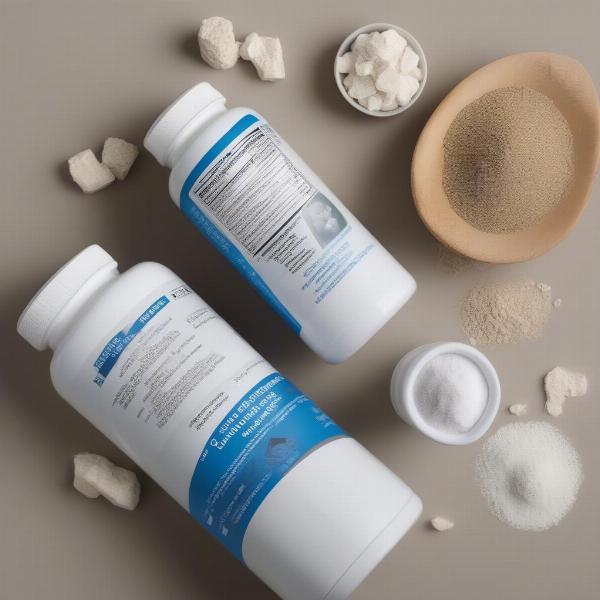Calcium is essential for dogs, playing a vital role in bone health, muscle function, nerve transmission, and blood clotting. While a balanced diet usually provides sufficient calcium, some dogs may require supplementation, especially puppies, pregnant or lactating females, and senior dogs. This guide will explore the benefits, uses, and potential risks of calcium powder for dogs, helping you make informed decisions about your furry friend’s nutritional needs.
Understanding the Importance of Calcium for Dogs
Calcium is the most abundant mineral in a dog’s body, primarily found in their bones and teeth. It’s crucial for maintaining strong bones and preventing conditions like rickets in puppies and osteoporosis in older dogs. Beyond skeletal health, calcium contributes to proper muscle contraction, nerve signal transmission, and blood coagulation. A deficiency can lead to a range of health issues, including muscle tremors, seizures, and bleeding disorders.
When to Consider Calcium Powder for Dogs
While commercial dog food formulated for specific life stages generally provides adequate calcium, certain situations may warrant supplementation. Rapidly growing puppies, pregnant or nursing mothers, and senior dogs often have increased calcium demands. Dogs with certain medical conditions, such as hypocalcemia (low blood calcium), may also benefit from calcium powder. However, it’s crucial to consult with your veterinarian before supplementing your dog’s diet with calcium, as excessive intake can lead to health problems. kelp seaweed for dogs can be a good source of natural calcium, too.
Choosing the Right Calcium Powder for Your Dog
 Types of Calcium Powder for Dogs
Types of Calcium Powder for Dogs
Not all calcium powders are created equal. Different forms of calcium vary in their bioavailability, meaning how well the body can absorb and utilize them. Calcium carbonate is a common and affordable option, but it’s best absorbed when taken with food. Calcium citrate is more readily absorbed on an empty stomach and is often recommended for dogs with digestive issues. Other forms include calcium phosphate and calcium gluconate. Your veterinarian can help you determine the most appropriate type and dosage of calcium powder for your dog’s specific needs. They may also recommend a vitamin mineral supplement for dogs to ensure a balanced intake of all essential nutrients.
Potential Risks and Side Effects of Calcium Powder
While calcium is essential, too much can be harmful. Excessive calcium intake can lead to hypercalcemia (high blood calcium), which can cause a range of symptoms, including vomiting, constipation, loss of appetite, increased thirst and urination, and lethargy. In severe cases, hypercalcemia can damage the kidneys and other organs. Therefore, it’s crucial to follow your veterinarian’s recommendations regarding dosage and monitor your dog for any adverse effects. Never give your dog human calcium supplements, as they may contain other ingredients that are toxic to dogs. Always consult your vet before considering supplementing with anything like can dogs have seamoss, as natural sources can also lead to overdosing.
What are the signs of calcium deficiency in dogs?
Answer: Signs of calcium deficiency in dogs can include muscle tremors, weakness, seizures, and difficulty walking.
How much calcium powder should I give my dog?
Answer: The correct dosage of calcium powder for your dog depends on their age, size, breed, and overall health. Always consult your veterinarian to determine the appropriate dosage.
Can I give my dog human calcium supplements?
Answer: No, you should not give your dog human calcium supplements. These supplements may contain ingredients that are toxic to dogs.
Are there any natural sources of calcium for dogs?
Answer: Yes, goat milk powder for dogs and certain types of seaweed, like kelp, can be natural sources of calcium for dogs. However, consult your vet before giving these to your dog.
Can I mix calcium powder with my dog’s food?
Answer: Yes, you can typically mix calcium powder with your dog’s food. Some forms of calcium are better absorbed with food. Follow your veterinarian’s instructions.
What are the benefits of calcium for senior dogs?
Answer: Calcium can help maintain bone density in senior dogs, reducing the risk of osteoporosis and fractures.
Are there any interactions between calcium and other medications?
Answer: Yes, calcium can interact with certain medications. Inform your veterinarian of all medications your dog is taking before starting calcium supplementation.
Conclusion
Calcium powder can be a beneficial supplement for dogs in specific situations, such as growth spurts, pregnancy, lactation, or old age. However, it’s essential to consult with your veterinarian before administering calcium powder to your dog. They can help determine the appropriate type, dosage, and monitor for any potential side effects. Providing a balanced diet with appropriate calcium levels is key to ensuring your dog’s overall health and well-being.
ILM Dog is a leading international pet website dedicated to providing expert advice on dog care and nutrition. We offer a wide range of resources on dog breeds, health, training, nutrition, and more. For expert advice on your dog’s specific needs, contact us at [email protected] or +44 20-3965-8624. ILM Dog is committed to helping you provide the best possible care for your canine companion. We also have information on preparing foods like how to prepare chia seeds for dogs.